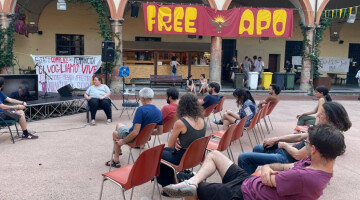In Istanbul, a protest demonstration was held against the legally disputed eviction of the building of the Mesopotamian Cultural Centre (MKM), which has been in use for 18 years. The protest in front of the building in the Tarlabaşı district was attended not only by the artists who had been evicted, but also by the HDP politicians Hüda Kaya and Elif Bulut and many other people in solidarity. The crowd chanted the slogan "Repression cannot intimidate us".
The first speech was given by the musician Çiya Şenses, who has been a staff of the cultural centre for many years and spoke in Kurdish. He stressed that the MKM has gone through very difficult times in the almost thirty years of its existence and is a centre of the cultures of the Middle East.
Şenses continued: "It is not wanted that we keep our Kurdish mother tongue and our culture alive. For this reason, the building where we have worked for many years is being evacuated. We inform you that the MKM will always be open despite all disabilities and we will continue to fight in other premises to keep the Kurdish language and culture alive. We are sad, but not helpless. Our people and their representatives stand by us and our struggle in the cultural field will continue. We will defend our culture, language and art in the Middle East, Istanbul and everywhere else."
HDP MP Hüda Kaya said in a speech that the Turkish government does not allow any opposition: "Those who belong to the opposition do not have the right to cultural activities and music. Opposition members are deprived of the right to earn their daily bread, receive an education, and work. The opposition doesn't even have the right to breathe."
History of the Mesopotamian Cultural Centre
The Mesopotamian Cultural Center was founded in Istanbul in 1991. The most famous co-founder was Kurdish writer Musa Anter, who was murdered by the Turkish state in 1992. The cultural centre made valuable contributions in the fields of music, theatre, dance, film and literature against the assimilation and ignorance to which Kurdish culture in Turkey is exposed. After Istanbul, branches were established in several Kurdish cities, all of which have since been closed by the Erdoğan regime.
RELATED NEWS:














